11 Big Tech & AI trends from 2023 to better prepare for 2024, Part 2: Growing P(ai)ns
February 14, 2024
Introduction
In the first part of our two-part series on big tech and AI, we found that while Canadians recognize the positive economic and employment contributions of big tech companies, their trust in big tech companies remains precarious.
As we conclude our series on big tech and AI, our attention turns to how Canadians engage with AI tools. This final part presents 6 top findings about AI, its uses, and its future!
6. 7 out of 10 Canadians have yet to use or try using AI tools
While AI tools such as ChatGPT continue to wield a growing influence over the lives of Canadians, the landscape of actual usage presents a more nuanced reality: 7 out of 10 Canadians have yet to use or try using AI tools. ChatGPT emerges as the frontrunner, with 24% of AI users who currently use the tool or have experimented with it before. Microsoft Bing Chat, a tool that entered the scene shortly after ChatGPT, follows somewhat closely with 12% of Canadians who report using it or having tried it in the past.

Overall, this suggests that experience with AI tools is still very niche among Canadians as of 2023, but might be called to grow in upcoming years: among respondents who do not use AI, about 1 in 4 said they would be interested in integrating AI tools into their life in the future. Unsurprisingly, younger individuals show the highest levels of both current AI adoption and enthusiasm for incorporating AI tools in the future.

7. Skepticism towards big tech is one of the reasons why some people shy away from using AI tools
Unfamiliarity with AI tools may be the main reason why most Canadians refrain from using them, but privacy and ethical concerns are also salient. 37% of respondents shy away from AI tools due to apprehensions about their privacy and security. 29% harbour ethical doubts regarding AI’s societal impact. 28% also express a lack of trust in the companies crafting these AI tools, reflecting a sentiment of unease regarding accountability and transparency in their practices. These findings not only underscore the complexity of attitudes towards AI but also emphasize the pivotal role of trust and ethical considerations in shaping their adoption.
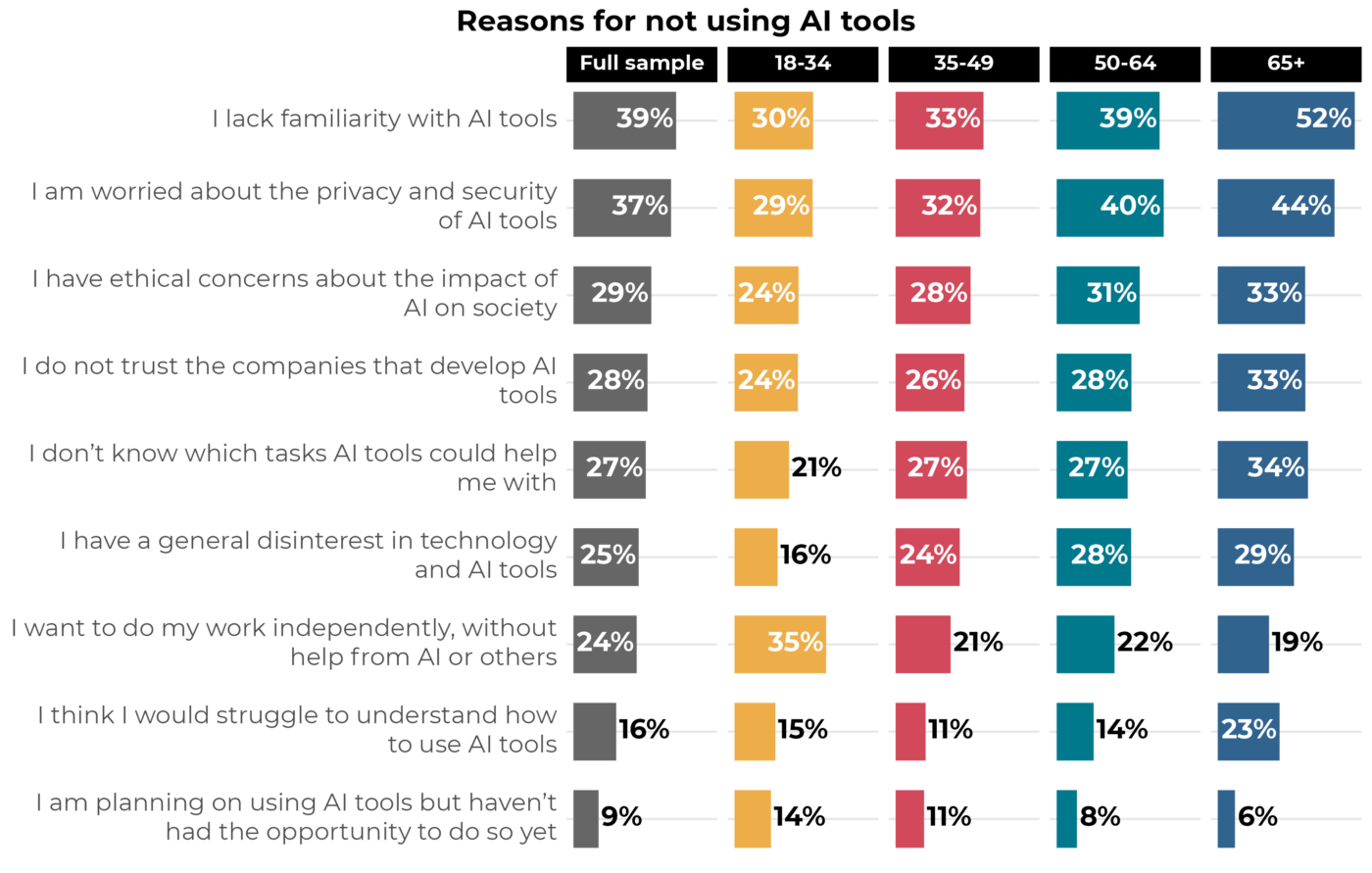
8. Very few people fully rely on AI-generated results — quality assurance is still part of the process
While respondents who are AI users are more trusting of AI tools compared to respondents who do not use AI tools, even AI users are not fully relying on AI-generated results. Indeed, 71% of ChatGPT users said they “often” or “always” need to double check the results of their requests to ensure accuracy. With that in mind, there is still a long way until these tools can operate independently from the need to double check their accuracy.
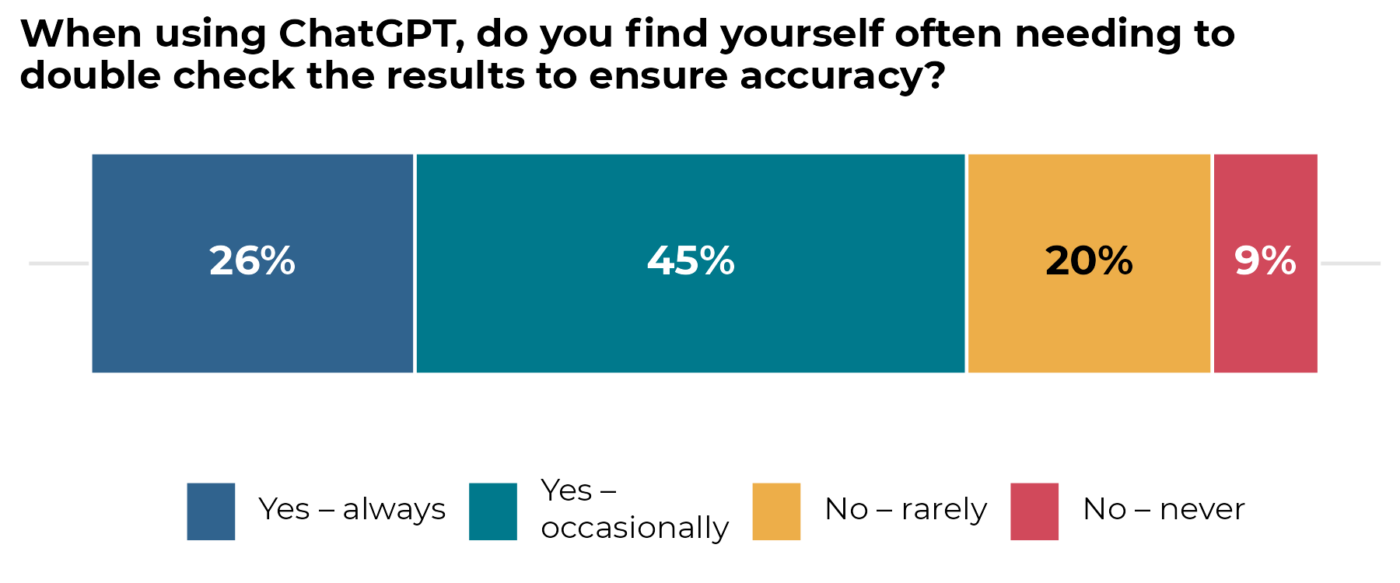
9. Users are mostly looking to turbocharge the traditional search experience through AI
AI users are embracing AI tools much like their trusty search engines. Specifically, 35-43% of AI users utilize these tools primarily for research and information gathering. Canadians seem to be wanting to turbocharge the traditional search experience through AI to make it faster and more efficient.
It is the younger crowd that is breaking away from this norm. These groups that are usually more tech-savvy, particularly those aged 18-49, are delving into the less chartered territories of AI. Around 41% of them are leveraging AI for problem-solving, a novel category not as popular among older demographics. This divergence might reflect the evolving mindset among the younger population. Growing up in an era where technology is ever present, they seem to be more inclined to explore AI’s potential beyond the conventional search domain. On the other hand, the older age groups, perhaps more accustomed to traditional search methods, may not be as interested in adopting new tools and this is reflected in lower usage rates at this current time.
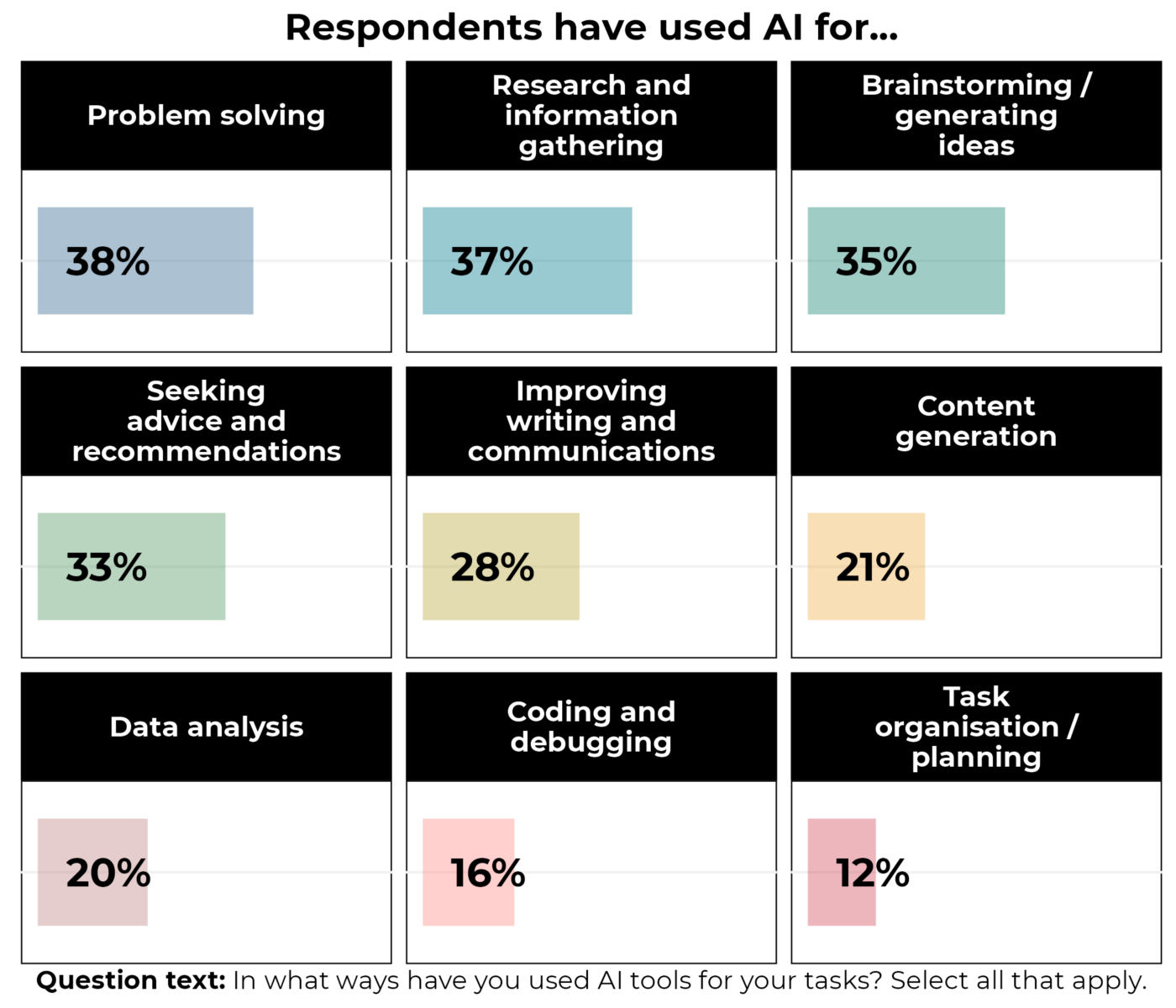
10. Opportunities for AI growth span from daily assistance with virtual tools to critical tasks such as cybersecurity
Canadians express diverse enthusiasm for the growth of AI: their interest in the expansion of AI spans from daily assistance with virtual tools like Alexa and Google Nest and research development to critical tasks such as cybersecurity and medical diagnostics. Older demographics express a slightly greater interest in the expansion of AI when it comes to areas such as medical diagnostics, manufacturing, and government services. That being said, 1 in 4 Canadians share a sentiment opposing the future expansion of AI, and this perspective resonates more strongly among those aged 35 and older.
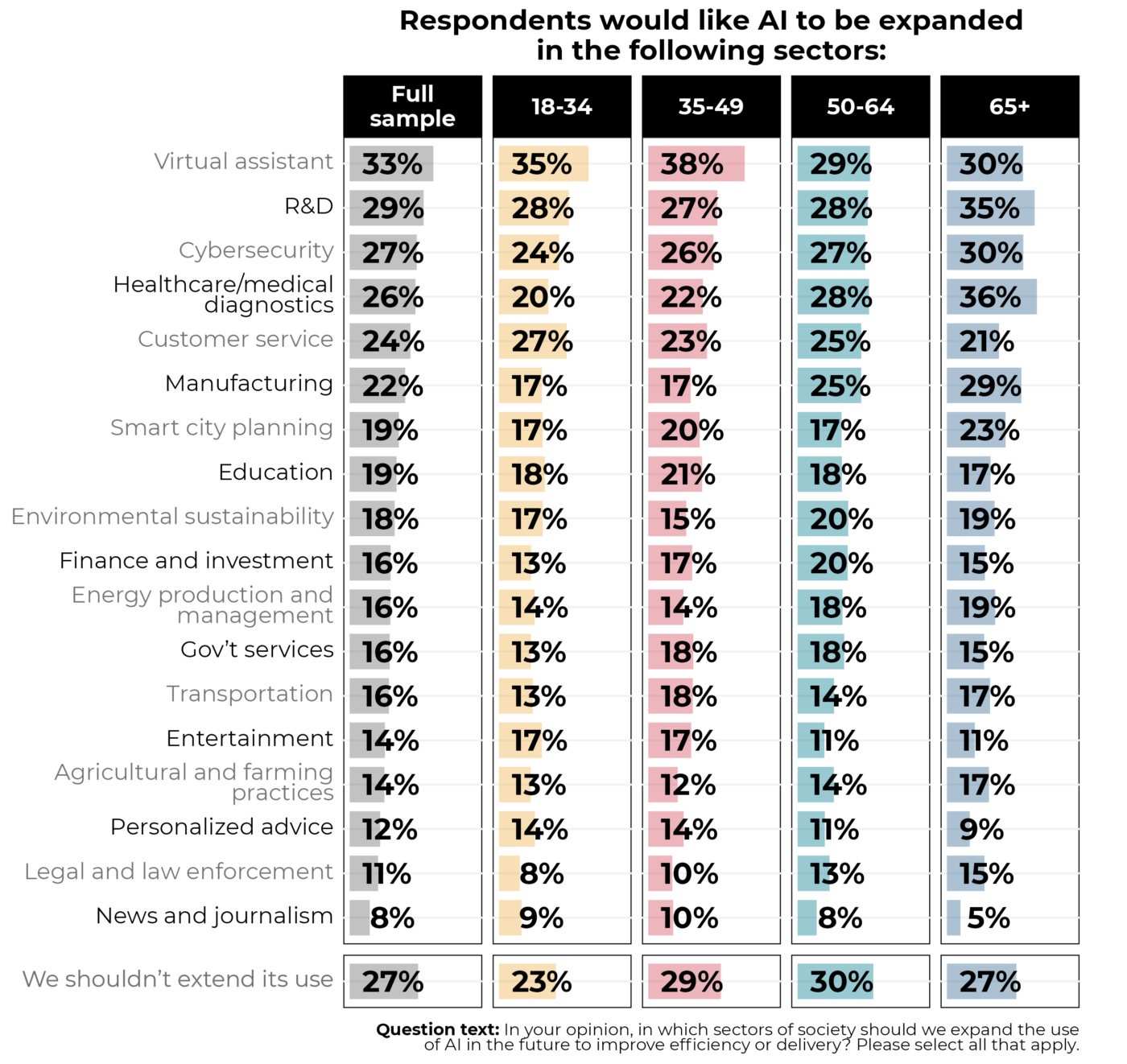
11. Privacy invasion, misinformation, and lack of regulations are some of the many concerns Canadians have about AI
Worries and concerns regarding the potential consequences of AI and the use of data-learning computer programs persist across various listed impacts. Among the listed potential impacts, most concerns have to do with security and accuracy issues, such as privacy invasion, AI-fueled misinformation, absence of AI regulations, and cybersecurity threats. In addition, the fear of losing human touch or personal interaction is also among the top concerns, cited by 75% of respondents.
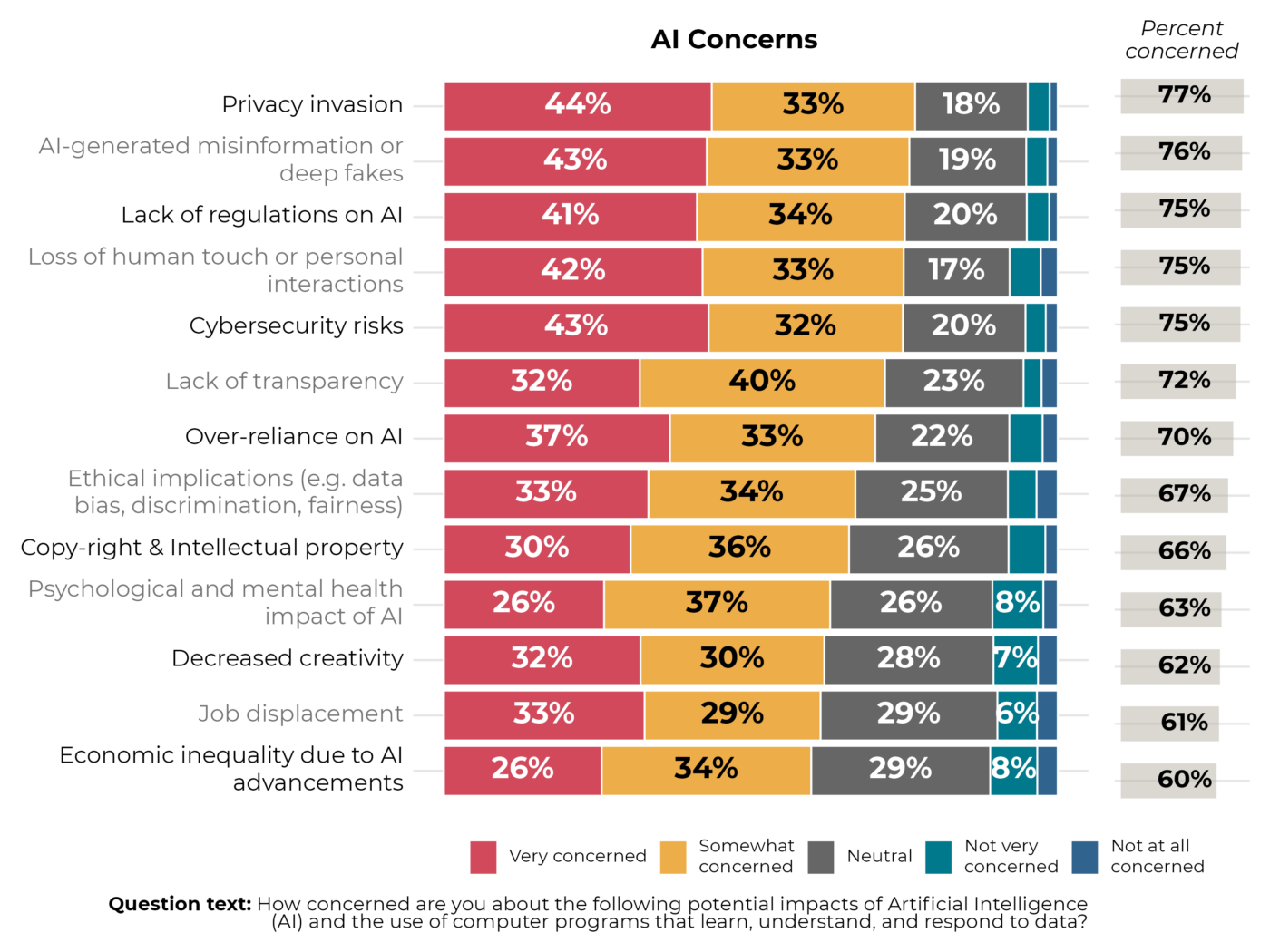
Conclusion: The adoption of AI tools by Canadians remains in its early stages, constrained by factors such as mistrust, ethical concerns, and a limited understanding of its application
As the trust dynamic between Canadians and big tech companies remains precarious, the rapid rise of generative AI has only intensified debates surrounding data security, content moderation and ethical considerations. These concerns have, in some ways, deterred Canadians from widely integrating AI tools into their daily lives, even if other barriers remain. Even among current AI users, adoption of AI tools remains at a rudimentary level, with many primarily using it as an advanced “search engine.” Nevertheless, our research suggests that younger Canadians and current AI users do exhibit a more optimistic and enthusiastic outlook regarding the future potential of AI.
Method
This online survey was conducted from October 10th to October 20th, 2023, among 1,000 Canadians aged 18 or older. Data has been weighted by age, gender, and region so as to be representative of the Canadian adult population. Although online surveys are not associated with margins of error, a probability sample of a similar size would have a margin of error of about ±3%, 19 times out of 20. For any question about this research or our methods, please contact [email protected].



